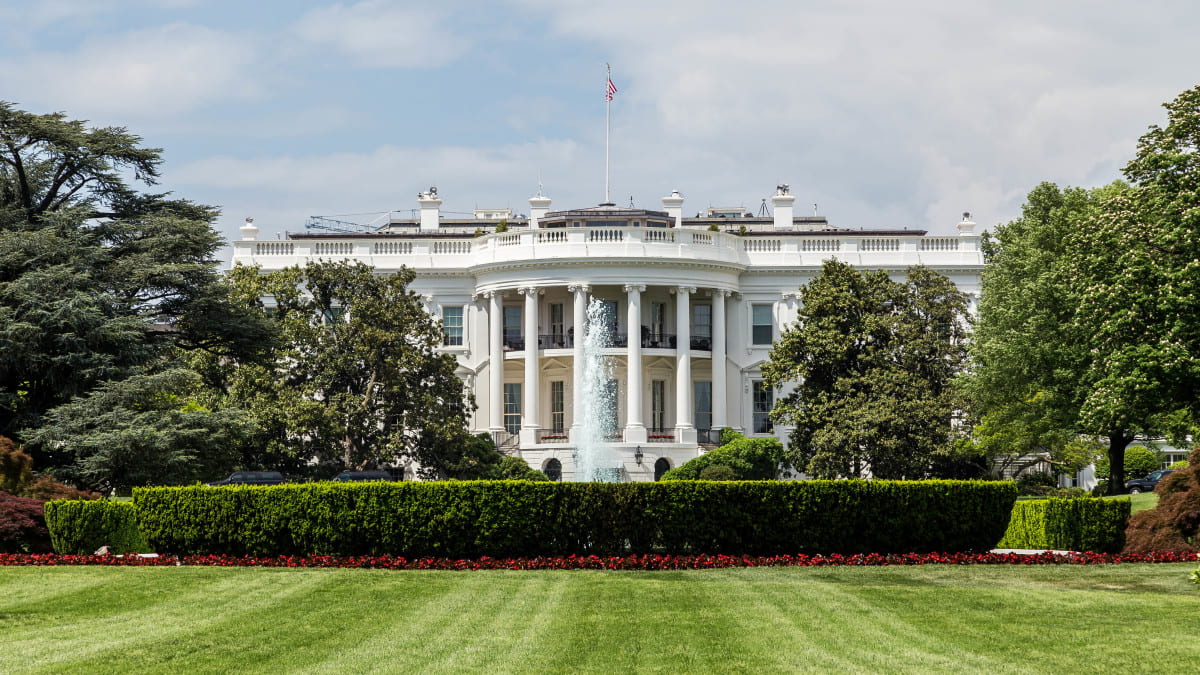Below you can find the finished reports provided to research policy mentors. Papers commissioned by governments and private entities and are produced by a team of Harvard Undergraduate research analysts to fill informational and analytical needs of the commissioner. Undergraduates work for one semester (4 months) with mentor guidance to produce reports. In addition, our organization provides training and expert connections to students in order to enhance research, writing, management and subject matter capabilities. Our organization also supervises analysts to ensure timely and quality production of reports to fit entity expectations. Depending on capacity and availability, groups that are capable present their work in person to mentors. Not all policy reports are made public due to confidentiality agreements with government entities.
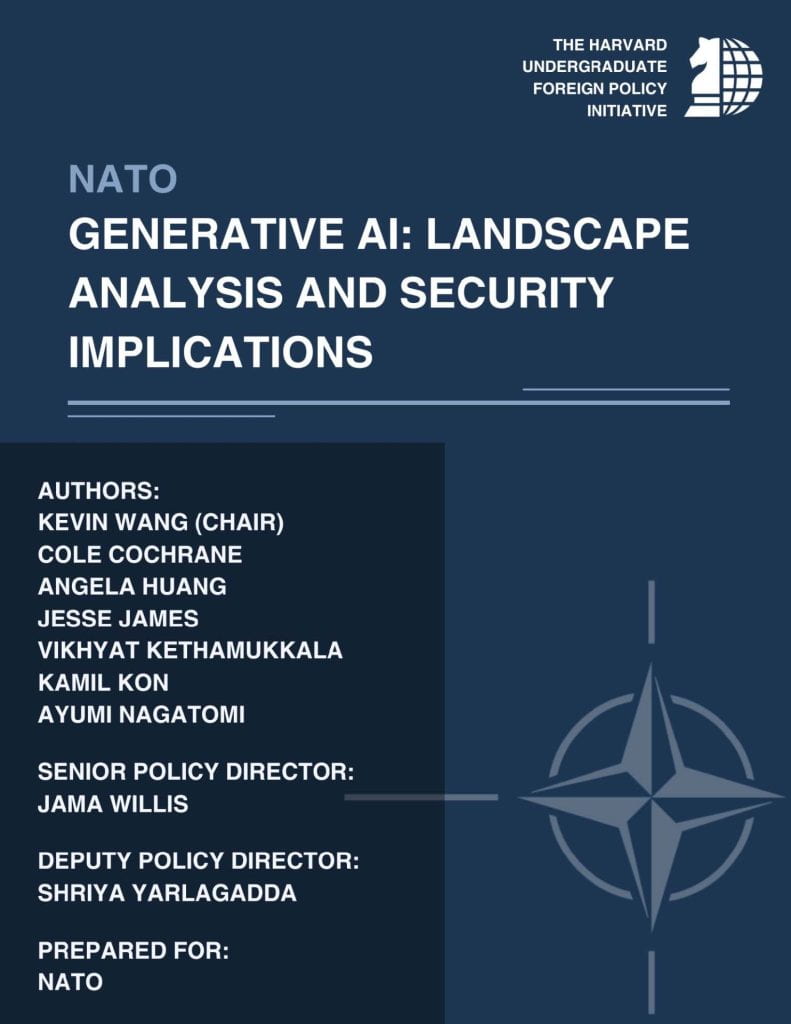
NATO
Rapid advances in the development of Artificial Intelligence have been on the radars of NATO leaders for years, especially in the context of the widely-discussed implications of this technology on innovation within the sphere of international security. To this end, NATO identified four primary goals in its most recent Artificial Intelligence Strategy, released in October 2021: promoting responsible use of AI for defense and security, accelerating AI adoption, protecting and supporting AI innovation, and safeguarding members from threats.
This project seeks to provide NATO officials with an up-to-date evaluation of the current landscape of generative AI development. Using this evaluation, our team then develops insights that may impact NATO’s updated strategy. Our team places a significant focus on Generative AI, starting with large language models (LLMs) and multimodal models, and its possible impact on defense and security. We focus on these technologies taking into account the current priorities of the NATO Emerging Security Challenges Division. However, other notable emerging technologies within the Generative AI space will be discussed as well.
This project — and report — is hence guided by the following questions: (1) What variations in scope, use, scalability, and compliance with NATO principles of responsible use exist in current and expected (within the next three years) developments in defense sector generative artificial intelligence (AI) within NATO member states versus in non-allied states, particularly Russia and China? (2) What are potential security implications of this variation within the next 10 years

COUNCIL OF EUROPE
Past human-rights in business-oriented policy initiatives on behalf of the United Nations, Council of Europe, and other national and international authorities, have improved human rights standards and aimed to boost private-sector adherence to those standards. The implementation of “National Action Plans” as a national-level framework for member states has gained traction amongst members of the Council of Europe. It is clear that the effectiveness of such initiatives, however, depends upon the political and economic landscapes of individual countries, specifically regarding human rights. Case studies of member states such as France and the U.K. demonstrate the capacity of nations to emphasize human rights, yet highlight challenges with enforcement. Conversely, nations such as Poland, Turkey, and Greece, which have struggled to implement similar policies and show a commitment to human rights at a governmental level, demonstrate the rarity of businesses undertaking human rights initiatives without pressure from public policy.
While the effectiveness of policy on private enterprise, and more broadly, valuation of human rights practices can vary at a national level, we’ve identified three key mechanisms through which adoption of human rights policy serves as a competitive advantage for business. First and foremost are the benefits to brand reputation, customer attraction, and customer retention. Second, the financial investment inspired by sound human rights practices, through human-rights-conscious investors and the rise of Environmental, Social, and Governance (ESG) investment. Third, the prioritization of human rights can induce supply chain sustainability and create a supply advantage, especially in times of crisis. L’Oreal and Marks & Spencer serve as case studies demonstrative of the tangible benefits that businesses gain when national policy guides the private sector towards adaptation of improved human rights practices.
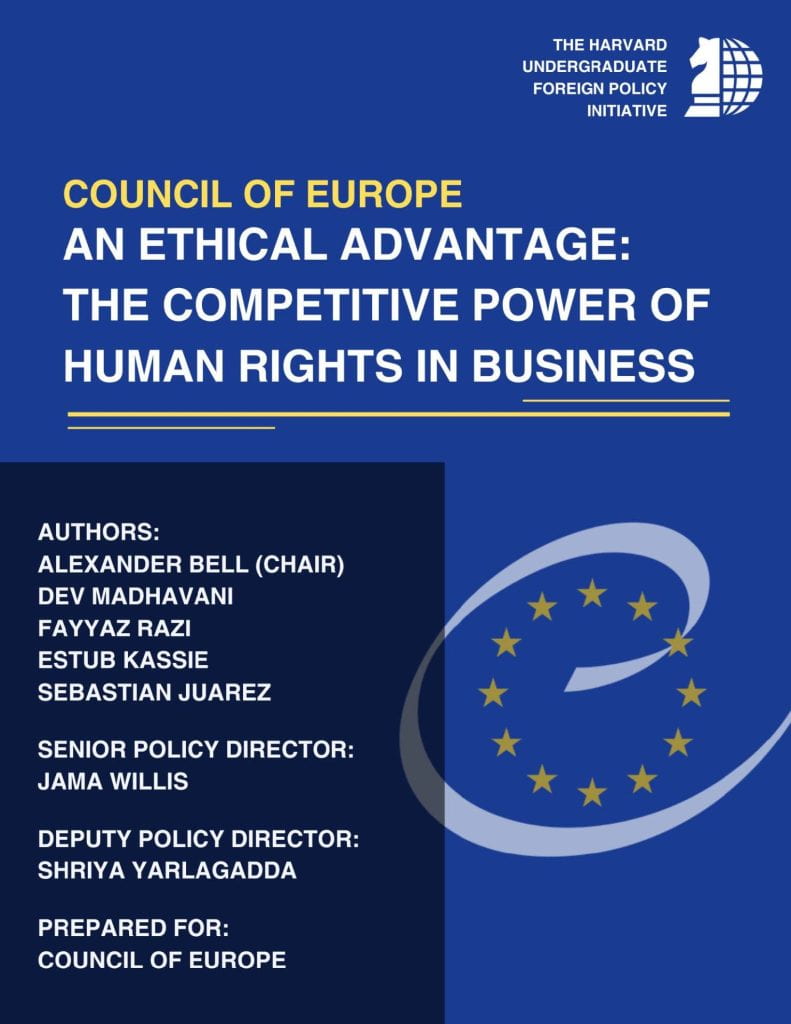
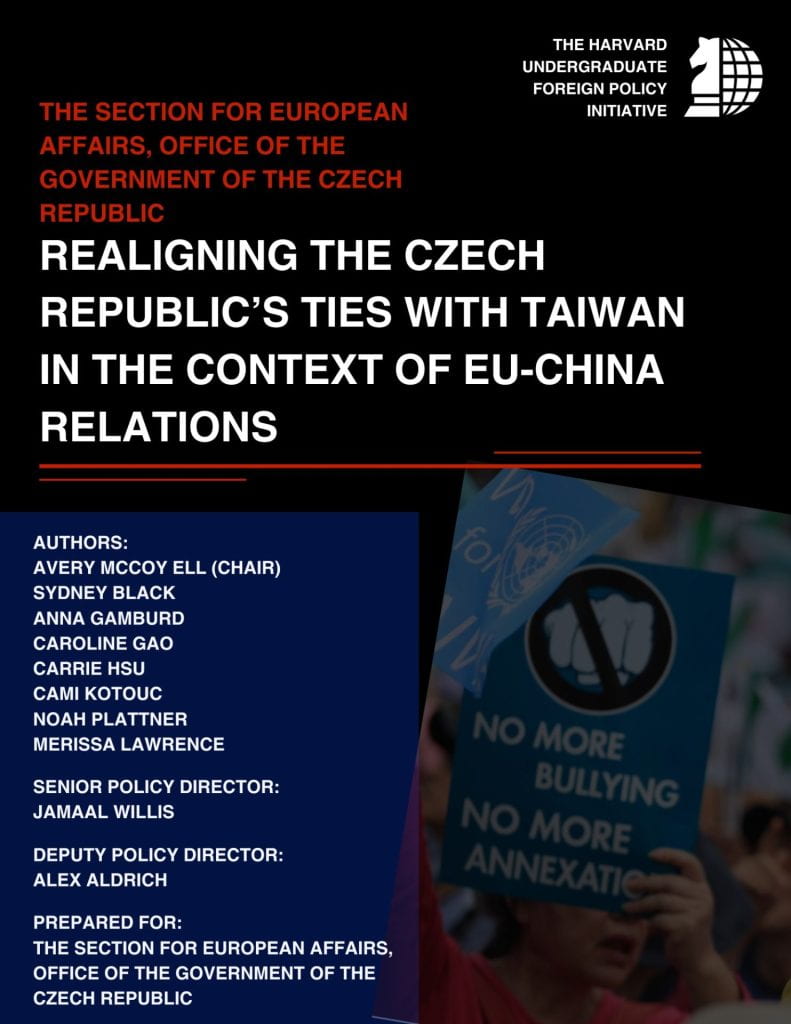
CZECH REPUBLIC
Despite both Czech and European Union reliance on China as an economic partner, Czech public opinion has driven preferences toward engaging and even formally recognizing Taiwan in the wake of concerns over the lack of democracy in China. This paper will explore the background of these issues, assess potential risks, review case studies in engagement with Taiwan, and present ways to encourage support of Taiwan without suffering from negative repercussions from China.
In order to decide how to move forward, it is essential to understand the perspectives of the European Union, Czech Republic, and China, respectively. Although economic partnership between EU member states and China continues, in recent years EU-China relations have increasingly shifted away from “engagement and cooperation” toward “engagement and rivalry.” Public opinion in the Czech Republic and the European Union more widely has also moved away from China in favor of Taiwan. Despite this trend away from China, China views its relations with the EU in a positive light, indicating a potential for backlash if ties were loosened.
Despite the Czech Republic’s small size, it is one of the most effective players in EU policy, particularly at the negotiation level. When looking towards developing relations with Taiwan, establishing partnerships with other EU countries, such as Lithuania and Denmark, is a viable pathway to encourage cooperation and mitigate risks.

COUNCIL OF EUROPE DEVELOPMENT BANK
While the physical toll and widespread loss of life in war are frequently emphasized, the conflict in Ukraine has precipitated a mental health crisis within the nation. Swift intervention is imperative, as the enduring repercussions of this crisis remain uncertain and possess the capacity to irrevocably reshape the societal fabric of Ukraine. Many Ukrainians consider the mental health crisis, exacerbated daily, the “most significant impact of the war,” and the effect of the war on the development of anxiety disorders and other mental disorders is already measurable.
To bolster mental health services in Ukraine, the findings of this report suggest that the CEB should invest primarily in human capital development, targeting educational programs for professionals and supporting peer-to-peer counseling, especially among youth. The CEB may additionally consider financing awareness campaigns to combat the stigma surrounding mental health, utilizing efficient social media outreach and partnering with remote mental health service providers for immediate care and stigma reduction. These strategic investments– detailed in the following pages– aim to improve both immediate and long-term mental health care infrastructure and service accessibility in Ukraine, supplementing the existing match-factors between Ukraine and the CEB in the social care and housing sectors.
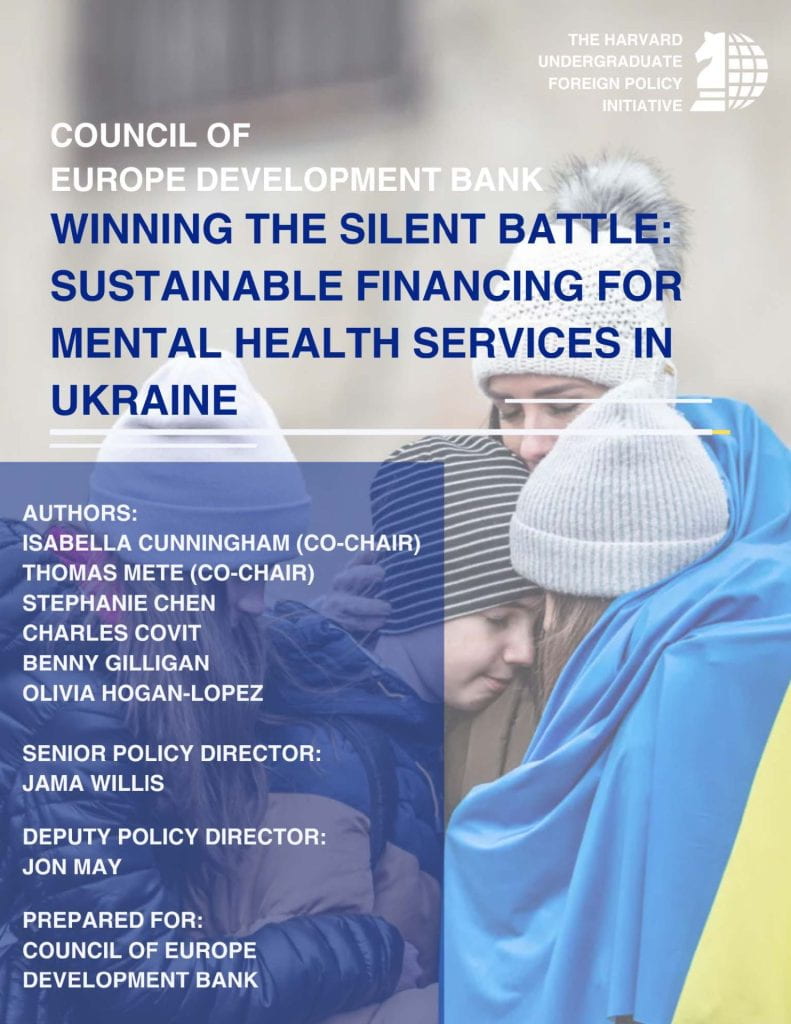
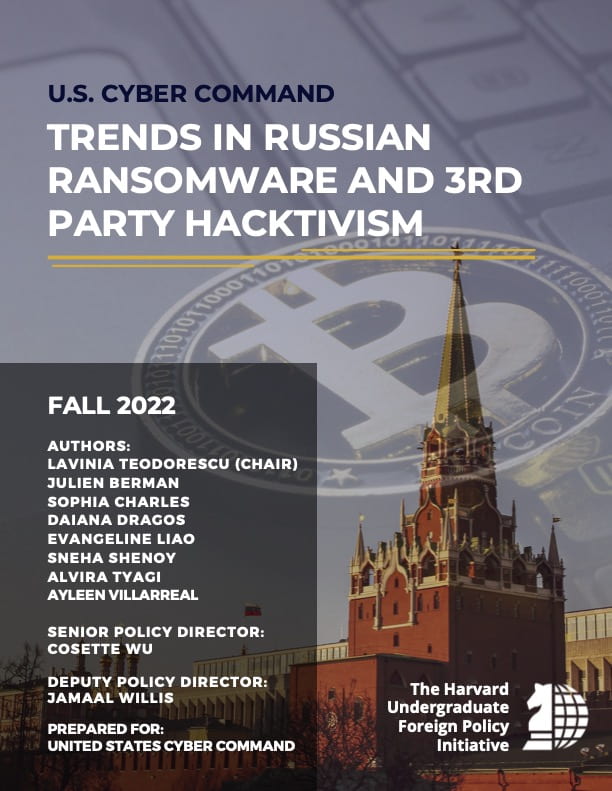
U.S. CYBER COMMAND
Russian Ransomware continues to be a central challenge to American national security both due to its impact on the government and to private companies and individuals. The increasing developments in open-source intelligence has changed calculations on both the side of defense and security as well as for malicious actors and hacktivists. Much of the information and statistical analysis in this research have been gathered from open-source analysis, which allowed us to study the subject matter beyond government-published information.
In the beginning of 2022, the war in Ukraine appeared to signal an increase in cyber attacks against the west. The United States and our allies expected to observe a growth in ransomware strikes and hacktivism following the escalation of conflict and the involvement of the international community. However, as we are drawing closer to the end of the year, the statistical analysis has proven different – ransomware attacks against the United States have maintained constant and even decreased at times.
A few of the most frequent areas of attack include elections, government and academia. In this research paper, we are analyzing both general trends in ransomware and economic trends in cyber crimes. The most relevant areas of attack are outlined in Chapter 2: Trends, and further developed in the remaining of the paper and the policy recommendations. Chapters 4 and 5 outline the impact of kinetic attacks and attacks on military, which are important considerations for the following chapter on cyber-attack attribution. Hacktivism has had a substantial financial effect in the Ukrainian war, and continues to play a significant role in its development. Lastly, the policy proposals cover three different areas of focus: social media, attribution and academia.

U.S. DEPARTMENT OF STATE: BUREAU OF INTELLIGENCE AND RESEARCH
Throughout the past decade, China has grown its presence in Latin America in several areas, getting involved with regional institutions and forming economic, diplomatic, and military ties in crucial sectors including infrastructure, energy, research, technology, and public health. This involvement has allowed China to infiltrate its values and opinions on Latin American diplomacy, taking measures that are beneficial to Chinese trade and economy while shaping Latin American policies.
This policy brief examines the technology sector as well, including the Digital Silk Road (DSR) and its role in expanding broadband internet access. Led by Huawei, Chinese companies have provided new products such as 5G technology, cloud computing, and advanced surveillance technology. The paper also discusses the political concerns associated with these partnerships.
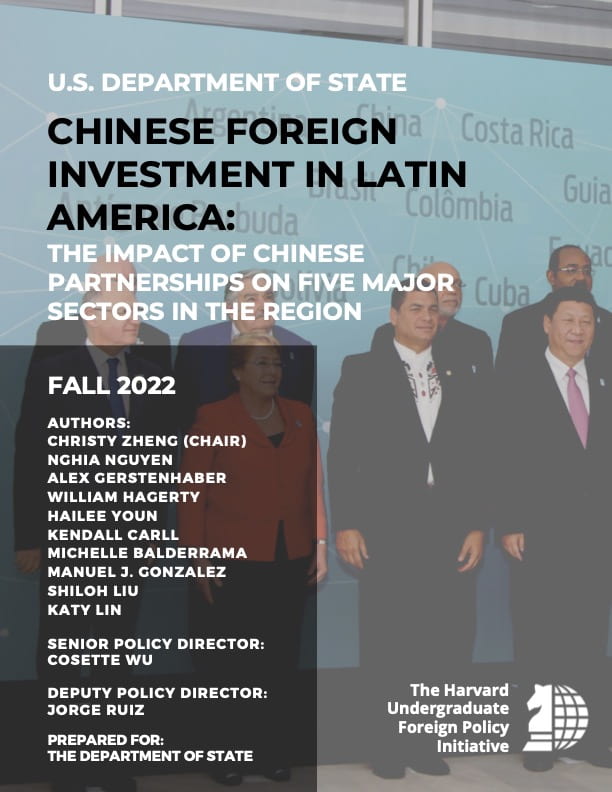

U.S. DEPARTMENT OF STATE: BUREAU OF LEGISLATIVE AFFAIRS
Post 9-11 US arm sales to the Middle East have been a point of contention in academic, political and civilian circles. The debates are complex, with people agreeing and disagreeing based on a large variety of distinct factors that all have merit to be taken into account.
However, as relations have developed, there have been clearer lines along which arm sales can be analyzed. With different voting blocks forming in both the Congress and in general elections, it is important to explore how Middle East arm sales are perceived socially, economically, politically, and in the context of how changes to such policies affect the individual American.
The recent developments continually put into question whether or not the United States should continue to support its clients in the Middle East. Furthermore, inquiry about whether it is our role to provide such arms creates a discussion that is multifaceted and reaches far beyond the scope of purely describing who our clients are, and why we provide said arms. With this in mind, this paper proposes looking into congressional opinions based on the history of clients, why the United States sells weapons, how arm sales are considered, and why these congressional opinions differ along certain lines. In the latter half of the paper, the paper also proposes recommendations based on this research that are considered to be both applicable and feasible

NEW ZEALAND PARLIAMENT
Hazardous drinking presents several public health challenges, including but not limited to increased incidents of violence and disease. New Zealand faces particular hurdles, in that more than ⅓ of people between 18 and 24 are hazardous drinkers, with Māori and other indigenous populations being 1.79 times more likely to be considered hazardous drinkers. Although New Zealand passed the 2012 Alcohol Sale and Supply Act, intending to increase community involvement in local alcohol policy, some Māori communities have not seen a shift in alcohol-related incidents. The intended benefit to the communities and the lack thereof must be better understood. How then, might New Zealand effectively reform current alcohol policy while maintaining community involvement and ensuring structured alcohol regulation such that hazardous drinking is discouraged and its impacts decreased?

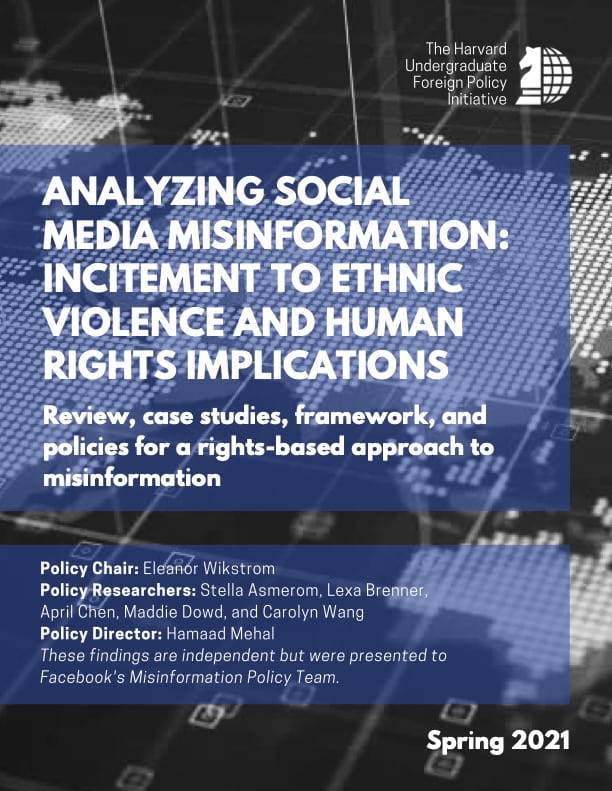
In this research report, our Policy Team aims to provide a workable answer to the following question: In the absence of social media-specific directives from the UN and global governing bodies, how can Facebook use existing human rights frameworks to construct a rights-based approach to misinformation and harm? We begin with a review of existing legislation and human rights guidance with respect to content moderation and misinformation on social media, and proceed to identify gaps in the current ability of international law to combat and measure the consequences of misinformation. We then analyze three international case studies where misinformation on social media has resulted in ethnic violence, and analyze the exact nature of both the types of content shared and the conditions necessary to result in violence and human rights violations. Using the findings of these case studies, we then propose a framework on defining a given post of misinformation as incitement to ethnic violence. Such a framework is then employed to recommend content policies which, in conversation with the current Community Standards, provide a clearer understanding of how Facebook can adopt a human rights-based approach with regards to viral misinformation.

EUROPEAN COURT OF JUSTICE
The digital age has brought enormous benefits to citizens around the world. We have access to the combined knowledge of humanity at our fingertips through search engines like Google and on platforms like YouTube. Social media has enabled easy communication across the world in an instant, breaking down national barriers. Digital banking has streamlined financial transactions globally, improving business and improving livelihoods. Online classes have allowed for education to continue even within the midst of the gravest pandemic in a century.
Yet these remarkable innovations have not come without a cost. Incredibly powerful companies have emerged as a result of the digital age, wielding enormous political and societal influence. Concerns of privacy have become prevalent as our data is transferred and used in ways too complex to be understood by the average citizen. Mental health issues have become ever more common amid an age of constant connectivity and attention-seeking. Political manipulation and misinformation of large segments of the population have been possible due to highly specific data on everyday citizens.
The issues with the technology sector have become ever more apparent, leading to popular discontent. Around the world, calls for regulation of big tech have become more vocal. Litigation against tech firms has prompted judicial rulings imposing significant fines on tech companies. Yet the legal approach to addressing concerns of competition and antitrust in the technology sector is far from cemented. To date, no systematic legal framework with a deep understanding of the impact of regulation on the operations of technology firms has emerged. Our paper seeks to outline a new approach to address questions of antitrust against tech firms. Specifically, we propose a legal framework for the European Court of Justice (ECJ) to implement when ruling on big tech regulatory cases.

